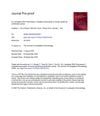 25 citations,
August 2007 in “Molecular Therapy”
25 citations,
August 2007 in “Molecular Therapy” Researchers found a safe and effective way to pick genetically modified skin cells with high growth potential using CD24.
 February 2024 in “New phytologist”
February 2024 in “New phytologist” DNA changes in tetraploid wheat improve root growth and nitrogen use.
 40 citations,
November 1998 in “The journal of investigative dermatology/Journal of investigative dermatology”
40 citations,
November 1998 in “The journal of investigative dermatology/Journal of investigative dermatology” S100A3 protein is crucial for hair shaft formation in mice.
 11 citations,
March 2013 in “Gene”
11 citations,
March 2013 in “Gene” A certain genetic variation in the IL1A gene may lower the risk of a hair loss condition in Chinese people.
 2 citations,
March 2022 in “Research Square (Research Square)”
2 citations,
March 2022 in “Research Square (Research Square)” Seasonal changes affect gene activity linked to hair growth in Angora goats, influencing mohair quality.
1 citations,
January 2021 in “Processes” Researchers successfully grew horse skin cells that produce pigment from hair follicle samples.
 4 citations,
May 2021 in “The journal of investigative dermatology/Journal of investigative dermatology”
4 citations,
May 2021 in “The journal of investigative dermatology/Journal of investigative dermatology” ELL is crucial for gene transcription related to skin cell growth.
10 citations,
November 2008 in “Veterinary Dermatology” The mouse hairy ears mutation causes longer ear hair due to changes in gene expression.
 June 2023 in “Frontiers in Genetics”
June 2023 in “Frontiers in Genetics” Genes related to calcium signaling and lipid metabolism are important for curly hair in Mangalitza pigs.
 1 citations,
December 2022 in “BMC Genomics”
1 citations,
December 2022 in “BMC Genomics” The Msx2 gene affects feather development in Hungarian white geese and a specific gene variation could indicate feather quality.
 10 citations,
February 2019 in “Toxicological Sciences”
10 citations,
February 2019 in “Toxicological Sciences” Finasteride exposure affects gene expression and anogenital distance in male rat fetuses.
 December 2023 in “International Journal of Molecular Sciences”
December 2023 in “International Journal of Molecular Sciences” Men with early balding showed higher levels of certain genes linked to hair loss and possibly prostate cancer.
 October 2023 in “Scientific Reports”
October 2023 in “Scientific Reports” Oxytocin may help hair grow by increasing hair growth-related genes and factors.
1 citations,
January 2017 in “Journal of Dermatology and Venereology” The plant extract and minoxidil both reduce hair loss by lowering specific gene expressions.
February 2025 in “Journal of Nanobiotechnology” A new treatment using microneedles with black phosphorus and laser helps regrow hair effectively and safely.
 18 citations,
April 2013 in “PLOS ONE”
18 citations,
April 2013 in “PLOS ONE” Mice with autoimmune hair loss showed signs of heart problems.
 December 2022 in “Türk biyokimya dergisi”
December 2022 in “Türk biyokimya dergisi” The conclusions are: fecal short-chain fatty acids may help prevent cancer, fiber intake can reduce obesity, weight loss is hard for obese people, low BMI cancer patients are more prone to chemotherapy side effects, intermittent fasting benefits gut health, cherry laurel has health benefits in rats, certain gene variations can increase stress in hair loss patients, fecal acids can affect blood sugar levels, cold agglutinin can affect blood test results in autoimmune patients, and people with Crohn's disease have higher levels of a certain chemical in their blood.
 June 2024 in “Skin Research and Technology”
June 2024 in “Skin Research and Technology” hsa-miR-193a-5p may help diagnose and treat alopecia areata.
 1 citations,
June 2023 in “Journal of Cellular and Molecular Medicine”
1 citations,
June 2023 in “Journal of Cellular and Molecular Medicine” The new method using gene-modified stem cells and a 3D printed scaffold improved skin repair in mice.
 7 citations,
June 2022 in “Frontiers in Veterinary Science”
7 citations,
June 2022 in “Frontiers in Veterinary Science” Researchers found genes linked to hair growth cycles in Inner Mongolia cashmere goats, which could help understand and treat hair loss.
 12 citations,
September 2018 in “Naturwissenschaften”
12 citations,
September 2018 in “Naturwissenschaften” Melatonin treatment increases a specific RNA in goat cells that boosts cashmere growth.
2 citations,
May 2022 in “International journal of molecular sciences” Changes in KRT17 gene activity linked to wool production in Angora rabbits.

Ajwain seed extract improved skin healing and hair growth in a mouse skin irritation model.
 1 citations,
October 2020 in “PubMed”
1 citations,
October 2020 in “PubMed” Azelaic acid helps protect hair cells from UV damage and encourages hair growth by increasing certain gene expressions and proteins.
 7 citations,
January 2018 in “Medicinski arhiv”
7 citations,
January 2018 in “Medicinski arhiv” A herbal extract may help treat certain types of hair loss by reducing a specific gene's activity.
 6 citations,
July 2013 in “Acta Clinica Belgica”
6 citations,
July 2013 in “Acta Clinica Belgica” The document concludes that combination therapy is most effective for treating excessive hair growth in women with idiopathic hirsutism, and more research is needed to understand the condition.
 February 2022 in “Research Square (Research Square)”
February 2022 in “Research Square (Research Square)” High TSPEAR levels in colorectal cancer predict worse outcomes.
 16 citations,
April 2017 in “Journal of Cosmetic Dermatology”
16 citations,
April 2017 in “Journal of Cosmetic Dermatology” Ficus carica leaf extract may help treat skin disorders by reducing inflammation and androgen effects in skin cells.
 January 2022 in “Research Square (Research Square)”
January 2022 in “Research Square (Research Square)” High TSPEAR levels in colorectal cancer predict worse outcomes.
 1 citations,
April 2023 in “International Journal of Molecular Sciences”
1 citations,
April 2023 in “International Journal of Molecular Sciences” Botryococcus terribilis Ethanol Extract may reduce inflammation by changing gene expression in cells.

























